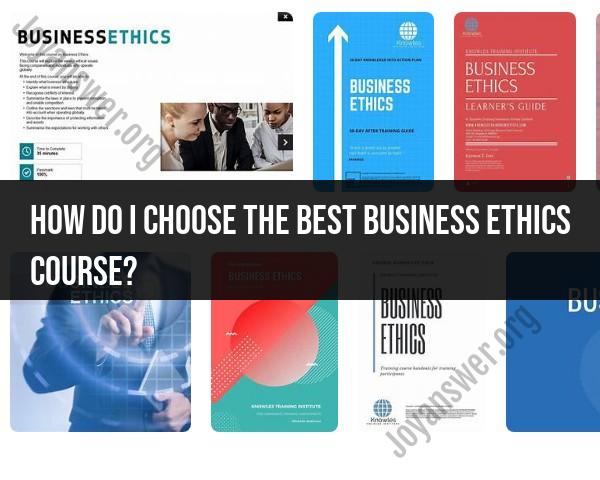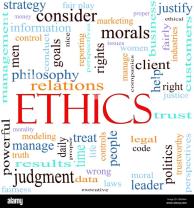How do I choose the best business ethics course?
Choosing the best business ethics course involves considering various factors to ensure that the course aligns with your learning goals, preferences, and career objectives. Here are some guidelines to help you select the most suitable business ethics course:
Accreditation and Reputation:
- Look for courses offered by reputable educational institutions or organizations. Accreditation ensures that the course meets certain quality standards. Check reviews, testimonials, or ratings from previous participants to gauge the course's reputation.
Course Content and Curriculum:
- Review the course content and curriculum to ensure that it covers relevant topics in business ethics. Look for courses that address current and emerging ethical issues in the business world. Check if the curriculum aligns with your specific areas of interest within business ethics.
Instructor Qualifications:
- Investigate the qualifications and expertise of the course instructor or instructors. A course led by experienced professionals, academics, or industry experts with a background in business ethics or related fields is likely to provide valuable insights.
Delivery Format:
- Consider the delivery format that best suits your learning style and schedule. Business ethics courses may be offered in various formats, including in-person classes, online courses, or a combination of both (blended learning). Choose a format that fits your preferences and availability.
Interactive Elements:
- Assess the level of interactivity in the course. Courses that include discussions, case studies, group projects, and practical applications of ethical principles can enhance your learning experience and provide opportunities for critical thinking.
Certification or Credential:
- Check if the course offers a certification or credential upon completion. A recognized certification can add value to your resume and demonstrate your commitment to ethical practices in the business environment.
Flexibility and Accessibility:
- Evaluate the flexibility and accessibility of the course. Consider whether the course allows you to learn at your own pace, whether it provides access to resources after completion, and whether it accommodates your other commitments.
Industry Focus:
- Some business ethics courses may have a specific industry focus, such as healthcare, finance, or technology. Choose a course that aligns with the industry or sector you are interested in or currently working in.
Cost and Financial Considerations:
- Consider the cost of the course and whether it fits within your budget. Some courses may offer financial aid, scholarships, or installment plans. Evaluate the value you will gain from the course in relation to the cost.
Reviews and Recommendations:
- Seek reviews and recommendations from professionals in your industry, colleagues, or online communities. Personal experiences and insights from others can help you make an informed decision.
Continuing Education Opportunities:
- Check if the course is part of a broader program or if it offers opportunities for further education and specialization in business ethics. Continuous learning in this field can be beneficial for staying current with evolving ethical challenges.
Networking Opportunities:
- Courses that provide networking opportunities with instructors, industry professionals, and fellow participants can enhance your professional connections in the field of business ethics.
By carefully considering these factors, you can choose a business ethics course that aligns with your career goals and provides a meaningful and enriching learning experience.
What criteria should be considered when selecting a quality business ethics course?
Selecting a quality business ethics course is crucial for maximizing your learning experience and gaining valuable insights into ethical decision-making within the business world. Here are some key criteria to consider:
Course Content and Structure:
- Focus and Depth: Does the course cover a broad overview of business ethics or delve deeper into specific areas like corporate social responsibility, sustainability, or ethical leadership? Choose a course aligned with your interests and needs.
- Theoretical Foundation: Does the course ground itself in established ethical theories and frameworks? Look for courses referencing thinkers like Kant, Mill, or utilitarianism.
- Practical Applications: Does the course offer real-world case studies and scenarios to apply ethical principles to concrete business situations? This helps bridge the gap between theory and practice.
- Currency and Relevance: Does the course address contemporary ethical challenges faced by businesses, such as technological issues, globalization, or environmental concerns? Ensure the content is up-to-date and relevant to current ethical debates.
Instructor Credentials and Expertise:
- Academic Background: Seek courses taught by professors or instructors with recognized expertise in ethics, philosophy, business, or related fields. Look for advanced degrees and publications in relevant areas.
- Professional Experience: Consider instructors with practical experience in business ethics consulting, compliance, or leadership roles in ethical organizations. Their real-world perspective can enrich the learning experience.
- Teaching Style and Methodology: Does the instructor offer interactive lectures, group discussions, case studies, or simulations? Choose a methodology that aligns with your preferred learning style.
Course Delivery and Platform:
- Format: Consider your preferred learning method. Self-paced online courses offer flexibility, while live online or in-person courses provide real-time interaction and networking opportunities.
- Technology and Platform: Evaluate the user-friendliness of the online platform if applicable. Check for features like discussion forums, video conferencing, and accessible course materials.
- Accreditation and Reputation: Opt for courses offered by reputable institutions, universities, or professional organizations specializing in business ethics education. Accreditation can further validate the quality of the program.
Additional Considerations:
- Cost and Value: Compare the cost of different courses with the offered content, format, and instructor credentials. Evaluate if the investment aligns with your learning goals and career aspirations.
- Reviews and Testimonials: See what previous participants have to say about the course content, instructor, and overall learning experience. Read reviews and testimonials to gain additional insights.
- Trial or Preview Options: Check if the course provider offers a free trial or preview modules to see if the format and content align with your expectations before committing.
By carefully considering these criteria, you can select a high-quality business ethics course that provides valuable knowledge, practical skills, and a deeper understanding of ethical decision-making in the complex world of business. Remember, the best course for you will depend on your individual needs and goals, so prioritize factors that best suit your learning style and professional aspirations.
I hope this information helps you navigate your options and choose the perfect course to enhance your ethical compass and contribute to a more responsible business environment!



